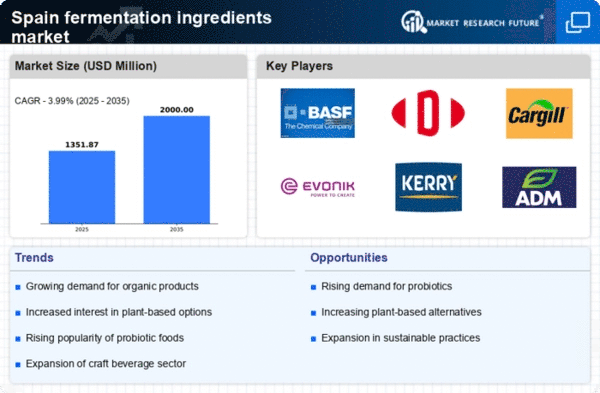Market Trends
Key Emerging Trends in the Spain Fermentation Ingredients Market
The fermentation ingredients market in Spain has witnessed notable trends in recent years, reflecting shifts in consumer preferences, technological advancements, and evolving industry regulations. One prominent trend is the growing demand for natural and clean-label ingredients. Consumers are increasingly seeking products with minimal processing and additives, driving manufacturers to incorporate fermentation ingredients known for their natural origins and health benefits. This trend aligns with the broader global movement towards healthier and more sustainable food options.
Additionally, there is a rising interest in fermented foods and beverages among Spanish consumers. Fermentation not only enhances the flavor and texture of food products but also offers various health benefits, such as improved gut health and enhanced nutrient bioavailability. As a result, there has been a surge in the production and consumption of fermented dairy products, bread, pickles, and beverages like kombucha and kefir. This shift in consumer preferences has spurred manufacturers to expand their portfolios of fermented products and innovate with new formulations to cater to diverse tastes.
Another significant trend in the Spain fermentation ingredients market is the increasing adoption of fermentation technology in food production processes. With advancements in biotechnology and fermentation techniques, manufacturers can now produce a wide range of ingredients, including enzymes, organic acids, and microbial cultures, more efficiently and cost-effectively. This has led to greater versatility in product development and improved scalability, allowing companies to meet growing demand while maintaining product quality and consistency.
Furthermore, sustainability has become a key focus area for the fermentation ingredients market in Spain. As consumers become more environmentally conscious, there is a growing preference for products and processes that minimize waste and reduce carbon footprint. Fermentation offers inherent sustainability benefits, such as the ability to utilize renewable resources, reduce energy consumption, and produce fewer greenhouse gas emissions compared to traditional manufacturing methods. Manufacturers are increasingly investing in sustainable practices throughout their supply chains, from sourcing raw materials to optimizing production processes and packaging solutions.
The rise of plant-based and alternative protein products is also shaping the Spain fermentation ingredients market. With a growing number of consumers adopting vegetarian, vegan, or flexitarian diets for health, ethical, or environmental reasons, there is a growing demand for plant-based protein sources. Fermentation plays a crucial role in the production of plant-based proteins such as pea protein, soy protein, and microbial protein alternatives. These ingredients not only offer nutritional benefits comparable to animal-based proteins but also align with the growing demand for sustainable and cruelty-free food options.
Lastly, the COVID-19 pandemic has had a significant impact on the fermentation ingredients market in Spain, accelerating certain trends while creating new challenges for industry players. The pandemic has heightened consumer awareness of health and wellness, leading to increased demand for functional foods and ingredients with immune-boosting properties. Additionally, disruptions in global supply chains have underscored the importance of building resilience and localization in food production. As a result, there is a renewed focus on supporting local farmers and producers and promoting food security through domestic production and sourcing strategies.


















Leave a Comment